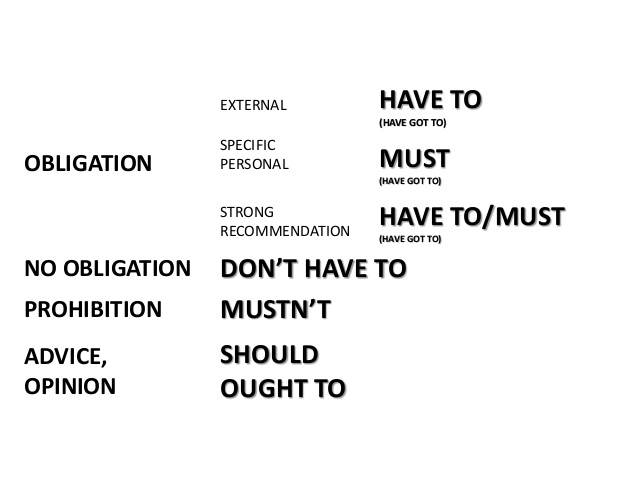This class explains how you talk about permission, rules, necessity and advice in advanced English. To do this we need to explain the differences between must, have to, ough to and should etc.
Had better: OBLIGATION
Had better is a very strong form of expressing necesity or advice. It almost always implies serious consequences if something is done or not done in the immediate future. The negative version of his phrase is ‘you had better not.’
- You’d better clean up the mess before mum gets back.
Should have – Ought to have: OBLIGATION/NECESSITY
We use should have / ought to have to talk about something that should have been done but wasn’t. This is good for talking about regrets or things that weren’t done correctly.
- You should have paid more attention to your girlfriend.
Have to: OBLIGATION
This is a verb that we use to express obligation. The most common type of obligation it brefers to are those that come from some external rule maker.
- You have to get a high score to enter Oxford university. (This is an obligation set by the university.)
Must versus Have: OBLIGATION
‘Must’ is usually synonymous with ‘have’ because they both express obligation. The difference is, however, that we tend to use ‘must’ when it is an obligation established internally – by ourselves.
For example, if you suddenely rememeber that you need to send an e-mail to your aunt to thank her for the christmas present – it’s ‘must.’
- I must write to my aunt.
However, if your parents are forcing you and obliging you to write to her (therefore making it an external obligation) you use ‘have to’.
- I can’t go out, Joe, because I have to write an email to my aunt.
Don’t have to: OBLIGATION (absence of)
If there is absoloutely no obligation to do something or to not do something…you use ‘don’t have to’. For example, if we’ve already bought Fred a birthday present amongst all his colleagues – you don’t have to buy him one.
- You don’t have to take your shoes off when you enter a church. It’s not a mosque.
Mustn’t: PROHIBITION – OBLIGATION
When someone tells you that you mustn’t do something, it’s a very strong way of saying that you are absoloutely prohibited from doing it.
- You mustn’t serve him nuts because he’ll have an alletgic reaction.
May: PERMISSION
Most of us know that ‘may’ is a modal verb that is synonymous with ‘might’. However, it’s also has another use: as a polite way of asking if simebody will allow you to do something.
- May I use the bathroom please.
Can: PERMISION/ OBLIGATION /PROHIBITION
Can is, of course, the most common form of asking permission. When I was a child, however, we were always taught that ‘may’ was what a gentleman uses when asking permision. It is also used to deny permision.
- Can I use the bathroom please.
- You can’t use the bathroom – it’s for customers only.
Need & Don’t need to
‘Need’ is a verb that we use to talk about necessity, therefore it exists in a grey area between permision and obligation.
- Necessity: you need to add water to the sauce to make it thinner.
- Obligation: you need to get a licence to carry a gun.
Needn’t: (ABSENCE of NECESSITY)
If something is not necessary then you can use ‘needn’t’. The curious thing about this phrase is that it removes the infinitive ‘to’ from the resulting verb.
- You needn’t wash the dishes…I have a washing machine.
Needn’t have: (ABSENCE of NECESSITY in the past but you did it anyway)
Sometimes you discover that you did something but – despite the fact you did it – it wasn’t necessary. In this case you can use ‘needn’t have’ + participle. However…remember that to use this you must have done the thing.
- We needn’t have bought a ticket because Mum had already bought us one.
If you are talking about something that simply was not necessary in the past (and you didn’t do it) then you can use ‘didn’t need to’.
- We didn’t need to buy wine because it was free.
Imagine in the above example that you had bought the wine despite it being free – then you could use ‘needn’t have.’
Vocabulary of permision and obligation
Here we have additional phrases and vocabulary that we use to talk about permision and obligations.
To not be able – This is used in the future to talk about things that will or won’t be prohibited in the future.
- You won’t be able to bring your dog on the train starting next week.
Allowed to –
- New doctors are not allowed to do surgeries without supervision.
To be permitted to – Formal.
- New recruits are not permitted to look senior officers in the eye.
To be supposed to /To be meant to – This is used for obligation – especially when talking about something you were supposed to do but didn’t.
- You were meant to arrive at 6 not 7.


Comments are closed.